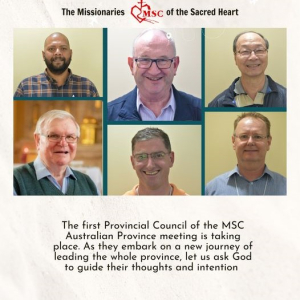Peter MALONE
July Province photos and stories
July Province photos and stories

Thanks to Hoa MSC for the compilation
One way to celebrate a birthday, Stephen at his first Provincial Council meeting

Bob Irwin and his course in Israel
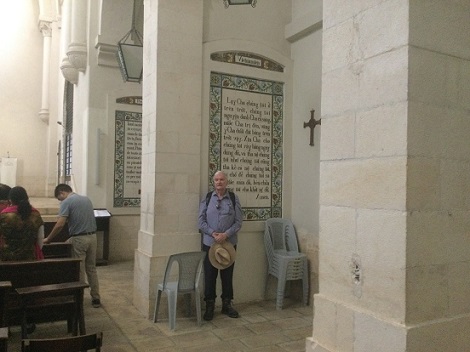
Ted McCormack and his birthday cake – 90.
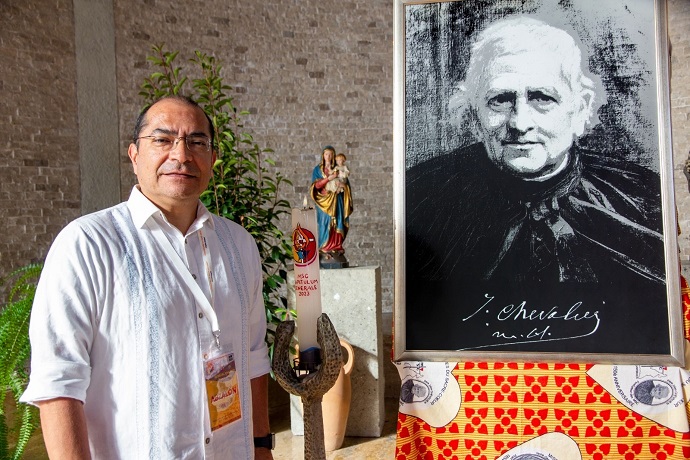
Quiet moments at Kensington, Cardinal John Ribat, Phil Hicks, Ben Fleming
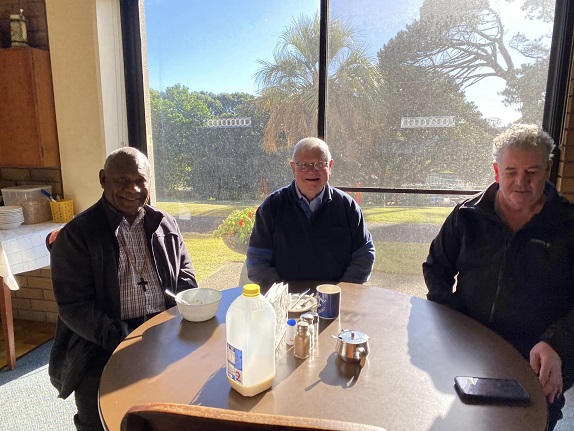
And Jac Boelen and Gerard Shanley
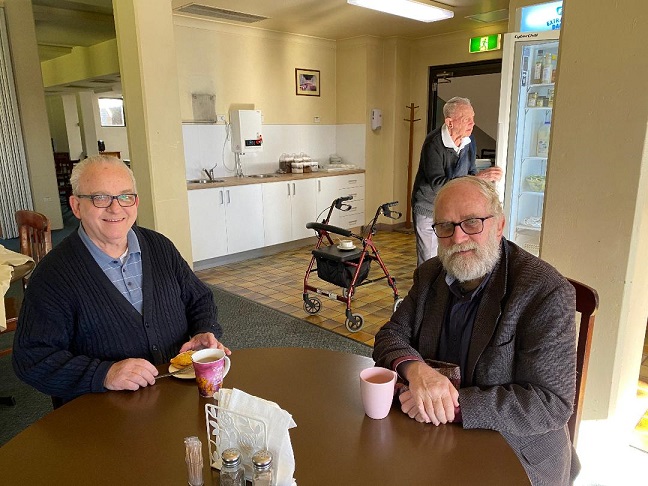
The Mission Conference
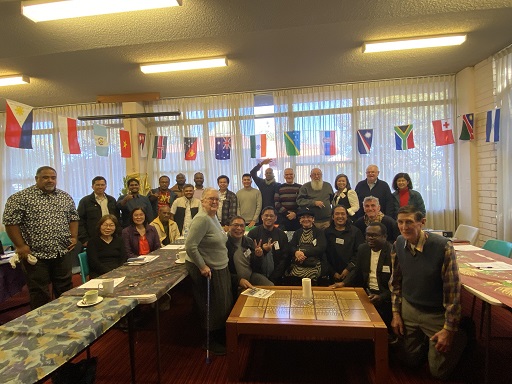
Richie Gomez, Philippine Province, explaining “CEPAGCO – MSC Centre for the Poor”

And seeing Parliament House
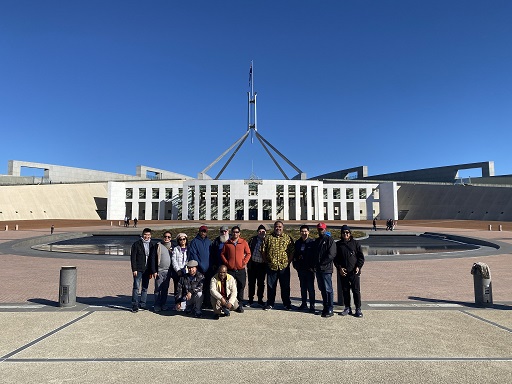
MSC entries on Wikipedia. An appeal.
MSC entries on Wikipedia. An appeal.

At the recent Provincial Chapter, there was a proposal that we prepare entries on MSC confreres for uploading to Wikipedia. There are a few entries at the moment, Dr Rumble, Paul Stenhouse. Our Colleges and parishes do have entries.
This is the entry for Bishop John Doyle MSC. There is an error in the date of his appointment as bishop. He was episcopally ordained on February 25th 1957, so the date should be 1956.
Francis John Doyle (born in 1897 in Noorat) was an Australian clergyman and bishop for the Roman Catholic Diocese of Alotau-Sideia. He was appointed bishop in 1966. Doyle retired in 1970 and died in 1973 in Port Moresby.
References
- "Alotau-Sideia (Diocese)". Catholic-Hierarchy. Retrieved 7 June 2021.
- "Bishop Dies". Papua New Guinea Post-courier. International, Australia. 5 November 1973. p. 3. Retrieved 7 June 2021 – via National Library of Australia.
So, the appeal is this – if you know of any articles on MSC confreres, or if you would like to write something, please contact me: This email address is being protected from spambots. You need JavaScript enabled to view it.
At present we have over 50 in process from Jim Lilttleton’s Remarkable MSC Series with Jim’s approval (including his chapter on Bishop Doyle).
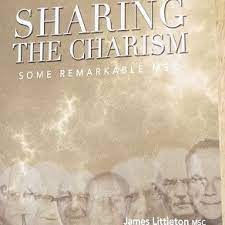
An acknowledgement of Jim’s years of research and writing to make so many of these men’s lives more accessible to us.

Any recommendations and advice welcome.
Last Manhunt, The
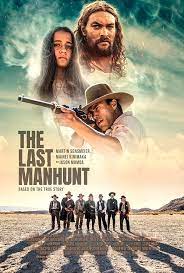
THE LAST MANHUNT
US, 2022, 103 minutes, Colour.
Martin Sensmeier, Maiei Minimaka, Lily Gladstone, Christian Camargo, Wade Williams, Jamie Sives, Tantoo Cardinal, Jason Momoa.
Directed by Christian Camargo.
This last manhunt, of a white posse pursuing a Native American, is based on fact, an episode of 1909, covering several hundred miles. It was previously dramatised on film in 1970s Tell Them Willie Boy is Here, starring Robert Blake as Willie Boy, Katharine Ross as the woman and Robert Redford in pursuit. The film was directed by Abraham Polansky.
This time this is a more sombre telling, directed by Christian Camargo who also plays the Sheriff. The screenplay was cowritten by Jason Momoa who also has a small cameo as Big Jim. This time the lovers are played by Martin Sensmeieer and Maiei Minimaka.
This is a rather slow-moving film, pursuit, not an exciting Western that many might have anticipated. Rather, it spends time looking at the situation of the Native Americans, the possibility of the relationship between Willie Boy and Carlotta, different tribes, hostilities, laws about relationships and marriage. It also looks at the white community, the men who go in pursuit of Willie Boy, the sheriff with his own private griefs, drinking, the other white members, the Native Americans who also travel. And, along with them, is a journalist who wants a sensational story so that he can move upwards in his profession.
Ultimately, this is a sad story.
1. An early 20th century Western? Based on actual characters in manhunt, 1909? The situation of native American Indians?
2. The background of 1909, the West, the towns, the role of the native Americans, racist attitudes? Tribal situations, law and lore? The details of life?
3. The scenic aspects of the film, the landscapes, the beauty, ruggedness, menace? The musical score?
4. Willie Boy, his family, situation, the relationship with Carlotta, her place in her tribe, her strict shaman father, the forbidden relationship? The confrontation, the death of the father, Willie Boy and Carlotta and the blame? Their escape?
5. The film detailing the pursuit, the bond between Willie Boy and Carlotta, their characters, love, dependents? The detail of the repercussions with the tribe, the various relatives, decisions?
6. The sheriff, the members of the posse, their situations, the sheriff and his memories of his wife, drinking, the pressure from the members of the posse? The range of Native Americans in the pursuit? Big Jim? The pursuit, the writing, the scouting, confrontations with Willie Boy, the shooting of the horses? Decisions about continuing the pursuit? The ruggedness of the situation? The groups going off to pursue the fugitives? Meeting again?
7. Randolph, newspaper background, his personality, clothes, horse, accompanying the group, wanting interviews, wanting to sensationalise the story, his career?
8. The background of the native Americans, their reaction to the pursuit, the conversation with the grandmother?
9. Willie Boy and Carlotta, through the mountains, the snakebite, Willie Boy and his going to the farm, getting the medicine? Carlotta and her death?
10. Willie Boy, the chase, his death?
11. The media, big Jim posing as the dead Willie Boy, the story, its publication, reality and folklore?
R.I.P.D 2: The Rise of the Damned
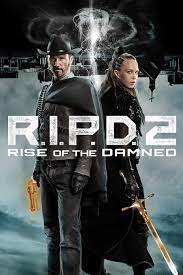
R.I.P.D.2: RISE OF THE DAMNED
US, 2023, 95 minutes, Colour.
Jeffrey Donovan, Rachel Adedeji, Penelope Mitchell, Evlyne Oyedokun, Jake Choi, Richard Brake.
Directed by Paul Leyden.
It would sound absurd to say that a film with this title has as one of its main characters Joan of Arc! But this is true. And, probably, indicates quickly the type of film that it is. In 2013 there was R. I..P. D. starring Jeff Bridges, based on a graphic novel. As is this film. However, it is a story of origins.
Many audiences, after the initial opening, 1876, scenes in Utah and Wyoming, where a prospector digging the earth opens up a gate of hell (open every 25 years) and becomes possessed by evil spirits which rise will be expecting a horror film. Those possessed have the undignified name of Deados. The main character possessed becomes ambitious, anxious to release as many spirits as possible so that the apocalypse will come and he can take over ruling the earth.
This is the serious side of the film, the horror genre, themes of gate of hell, the living dead, Apocalypse…
However, the dialogue is often very corny, may be offputting to the horror fans. However, this is the tone right throughout the film even as it becomes more and more absurd and apocalyptic.
Jeffrey Donovan is the sheriff of the town, protective of his daughter who returns from the city and is about to get married, not approving of her fiance. Meanwhile, there are gangs of gunfighters and miners leading to shootouts – including the death of the sheriff. He then arrives at Heaven’s Gate, a long conversation with the custodian who tells him that he has to go back to earth in order to achieve justice. He is given a partner who does eventually turn out to be Joan of Arc with her sword. However, they will not be recognised as themselves but rather will have African-American female avatars. More and more absurdity – but it may draw in audiences more and more who accept this kind of comedy.
The rest of the film, of course, consists of confrontations, the sheriff not allowed to reveal his identity, encountering the daughter’s fiance and accepting him, getting mixed up with one of the gang who wants to be redeemed and helps out, the opening of the gate of hell further, more and more Deados rising, a small file with the tear of Christ, carried by Joan, sprinkled, able to close the gate of hell!
There are some interesting visuals, especially towards the end with the visualising of the Deados and the diabolical presences. The kind of film that would be enjoyed as part of a cinema Monsterfest.
Cash/ Gold Brick

CASH/GOLD BRICK
France, 2023, 95 minutes, Colour.
Raphael Quenard, Igor Gotesman, Agathe Rousselle, Antoine Gouy, Nina Meurisse, Gregoire Colin, Yourssef Hajdi.
Directed by Jeremy Rozan.
The title tells all – cash as the overall theme. It is however the schemes to make money are carried out that keeps audience attention.
This is a French film, the setting the city of Chartres with its famous Cathedral, but a provincial town, dominated by a wealthy family and its company, dedicated to receiving perfumes from all over the world, packaging them and distributing them. At the centre is a young man from a working family, Daniel, who narrates the film. Glimpses of him as a child, at school with the son of the wealthy family, but relying on his best friend for support. Later, they set up a company for delivering packages but fall foul of the domination of the family’s industry in the town. Eventually, both friends work for the company.
But, Daniel is shrewd, concocts a method of taking some packages, the gold bricks of the title, from containers, innocently taking out the rubbish which contains the stolen packages, selling them online. Eventually, the police come investigating, Daniel denying that he has a computer, but going to some local distributors and doing a deal with them. Daniel prospers. Enter the female lead, Virginie, who works for the firm, but is not listened to in board meetings. A chance encounter with Daniel leads to further meetings, her resentment against the head of the firm, and quite a collaboration in stealing the perfumes and marketing them, leading to the employment of 10 of the workers in the factory to provide a streamlined method for stealing, concealing, getting the material out of the factory, storing it, distributing it…
There are complications because an online entrepreneur, selling perfumes, wants to buy the company. The son of the founder is not really interested in the company, is shown that his wife is having an affair with the entrepreneur, discovers that the perfumes are being stolen, arranges meetings so that he can get revenge on the entrepreneur, get a good price for his company… So, the film shows the elaborate method for stealing the perfumes, storing them, their being stolen by the thieves contributing to the deal – and a revenge by substituting a lot of the perfumes with water to the discredit of the entrepreneur when he buys the business.
Romance between Virginie and Daniel, and his getting enough money in order to buy the firm eventually. Will somebody do the same thing when he is the owner!
1. The title, the French title using English and the focus on money, lots of money, in hand? The English title and the focus on the boxes of perfume?
2. The French setting, the city of Chartres, homes, hotels, mansions, the factory and detail? The musical score?
3. A variation on a heist film, planning and plots, achievement, further complexities?
4. Daniel, his narration, living in Chartres, his mother wanting a view of the cathedral, the company and the town, everybody employed, Daniel at school, resentment towards Patrick, resentment towards the family and easy money, owning the town, everybody working for the family? His friend Scania? The decision to have their own company, financial difficulties, forced to the factory? Scania, getting the job, the foreman and the money deal? The job in the factory, the perfumes coming, their being packaged and sent out?
5. Daniel, shrewdness, ambitions, money, his plan for the perfumes, taking the boxes, taking them out in the garbage, recovering them, selling them online? The investigation by the police, his denial of having a computer? With Scania, going to the local dealers, their sales at the markets, the profits? Ambitions, growing his scam?
6. Virginie, Daniel and his encounter, at the restaurant, later discovering who she was, her relationship with Patrick, his taking over after his father’s death? The board meetings, her point of view, not accepted? Confronting Patrick, feeling her life was being wasted? The dinner with Daniel, her drinking, wanting revenge, Daniel and his plan, her participating? Her being the mastermind along with Daniel?
7. The developments, the recruiting of all the team, the characters, explanations of their work, seeing them in action, the detail? The scheme for taking the boxes, the storage, the storage for the money, Friday nights and the distribution of the money, the various extravagances of the group?
8. Brice, his online selling of perfumes, wanting to take over the company, his offers, information about the stealing, wanting to get the company a bargain rates? Employing And, the clash, Ange and his dealing with Patrick, the information about Brice and his wife, sending photos? Ange being employed, and emergency, becoming part of the group, spying?
9. The plan with the insurance, the trucks, Patrick and the discussions with Daniel, the various schemes? The heist being put into practice, the trucks, the takeover of the trucks, the storing of the perfumes? Ange, the photos, the tracks running him down, his escape, the farm with the gun, his death?
10. The visualising of the plans, then their execution, the watering down of the perfumes, Brice paying for the company, Patrick taking the money, Brice and his downfall, and Daniel planning to build up his finance and by the company? And with Virginie?
Last Daughter, The
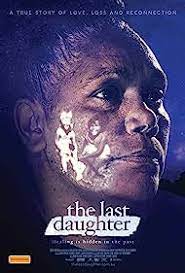
THE LAST DAUGHTER
Australia, 2022, 90 minutes, Colour.
Brenda Matthews, Max and Connie Ockers, the Simon Family.
Directed by Brenda Matthews, Nathanial Schmidt.
This documentary is based on a very personal book by Brenda Matthews who appears in this film and co-directs. It is a challenge for Australian audiences.
Brenda Matthews, in middle age, realises that she has been caught in two worlds. She presents the story of her being taken from her indigenous family, considered by the authorities as a neglected child, taken from her mother and her father who was an aboriginal pastor, falsely considered as neglectful. But, at such a young age, she has minimal memory of her family.
The film shows her growing up in a white family, caring foster parents, Mac and Connie Ockers, siblings, especially a sister, Rebecca. In these early years, she considers herself simply a part of the family, and the film incorporates photos and home movie sequences of her happy life. Eventually, she realises that she is black, unlike the rest of her family.
The film has quite an amount of interview material, especially the sympathetic Ockers who relish the memories of having Brenda as part of the family, but mystified about what happened to her when she was taken back to her original family. The film also has quite an amount of interview material with Brenda’s mother, with other members of the family, her mother elderly now, discovering the governmental accusations about neglect, the taking of Brenda. On being returned to her family, Brenda then grows up in that context but with vague memories of the past.
As the film opens, and the publication of her book, Brenda moves with her husband to investigate the past, to make contact with the Ockers. In her talking to camera, especially at her age and the many years having passed, Brenda is unsure as to what will happen. And her mother is not keen on the meeting.
Eventually, there is a meeting, the Ockers willing and delighted, the families travelling to meet each other, and the possibilities of understanding, of critiquing the policies of the Stolen Generation (and, in this case, its being exercised after the program was terminated in 1970). The Ockers are delighted to have this contact with Brenda again. There have been long experiences of hurt for all those involved and now is a time for healing the hurts, for reconciliation, for hope.
Passione
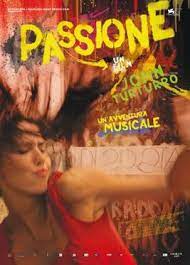
PASSIONE
Italy, 2010, 95 minutes, Colour.
John Turturro.
Directed by John Turturro.
Passione is an Italian film but is the work of American actor-director, Jon to Tara. It is a film in praise of Naples and its music.
Throughout the film there are many, many vistas of the city itself, the various neighbourhoods, streets, buildings, churches, shops… And, always in the background, Vesuvius and the mountains. To this extent, the film provides an enjoyable travelogue.
John Turturro comes to the camera, explains what he is doing, his devotion to Naples, especially its music, what it represents, how it is the voice of the people, age-old, despite the difficulties in its history (and references to the Camorra, and a lot of screen footage of Naples during the war and, especially, the liberation by the Americans).
At the end, during the credits, there are photos of the variety of singers as Well Is their names. There is quite a range, men and women, not glamorous stars and singers but rather, the people of the city, strong voices. For those who enjoy music and singing, there is almost an hour and a half of continuous song. For those who are sociologically minded, the film makes a great deal of linking the songs, the lyrics, the singers, to how the city of Naples ticks.
For most audiences, the songs will not be familiar except for O Sole Mio which is heard in a variety of versions. There is also a variety of dancing, Naples as an exuberant city.
John Turturro invites his audience to share his enthusiasm, his zest, and sit back and visit Naples, vistas, dance and, always, song.
Other People's Children/ Les Enfants des Autres
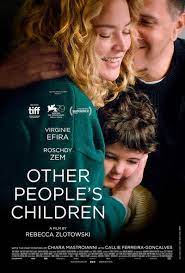
OTHER PEOPLE's CHILDREN/ LES ENFANTS DES AUTRES
France, 2022, 103 minutes, Colour.
Virignie Efira, Roschdy Zem, Chiara Mastroianni, Callie Ferreira-Goncalves, Yamee Couture, Sebastien Pouderoux, Frederick Wiseman.
Directed by Rebecca Zlotowski.
This is a very personal film by writer-director, Rebeccaatowski, reflecting on her own experiences, family (and casting her father as the father of the leading character, Rachel), on not having children, the emotional consequences for a woman, and exploring the maternal instinct. This is very much a film by a woman, for women, and an alert to the male audience, something of a plea for understanding.
The setting is Paris, ordinary life, homes and apartments, school. Rachel is played by Virginie Efira, prominent in French films in recent years. She is a strong screen presence, at times what might be described as “luminous”. While we observe her initially, we begin to identify with her, share her experiences – and the issue of working with other people’s children. Rachel is in her 30s, moving towards 40, time running out for her to have a child (and, later, a revelation that she had an abortion earlier. Interestingly, Rachel is from a Jewish family, goes to the synagogue with her father and sister, and has a discussion about Jewish tradition on abortion, whether the fetus can be considered a person, the father is suggesting that the tradition says that it is not – but that Jewish tradition is against child killing.) We see her as a dedicated teacher in her school, concerned about the students, especially a young boy, teenager, Dylan, difficult family background, not doing well at school, the staff meeting urging that he not return to school, Rachel organising a placement for him, pleading that he is the kind of student that the school should be working to support. It is clear that in her professional life, Rachel is dedicated to other people’s children.
Rachel becomes involved with an engineer, Ali (Roschdy Zem), separated from his wife, sharing the custody but much responsibility for his five-year-old daughter, Leila (quite a striking performance from the young Callie Ferreira-Goncalez). There is an intensity about Rachel’s commitment to Ali and, especially, to Leila, other people’s children. Leila is quite a wilful little girl, critical of Rachel and her presence, wanting her mother, but gradually getting used to Rachel’s presence, even doing a drawing which he presents to Rachel showing Rachel closer to her than her mother. Will her teaching and her relationship with Ali and Leila be Rachel’s fulfilment?
There is a further emotional complication when Rachel’s sister becomes pregnant and gives birth, Rachel a devoted aunt.
But, can this last? There is pain and pathos for Rachel, Ali making a decision for his wife, Rachel and the pathos of the farewell to Leila. The suggestion of a possible pregnancy – but only possible.
And that is how the film itself ends – but, there is an unexpected epilogue, very nicely judged, Rachel older and accepting her life, continuing her teaching, but being affirmed by her student, and her knowing her life is for other people’s children.
1. The title, tone, significance? Is focused on the character of Rachel, her experiences, motherhood, not having children, caring for other people’s children?
2. The Paris settings, homes, schools, the streets, outings, hospitals, doctors rooms? Realistic feel? The musical score? The Vivaldi, Doris Day singing Again? The final credits joy and song?
3. The writer-director, female, writing and directing at 40, her experience, family, the casting of her father as Rachel’s father, her sensibility, her sensitivities? Understanding female characters? Understanding male characters? Audience identifications?
4. Rachel story, Virginie Efira’s screen presence, luminous, sympathetic, strong, tender, assertive, vulnerable? Her age, the revelation about her past, relationships, pregnancy, abortion? Jewish background? At the synagogue, the prayer, her father and sister? The discussion about the Hebrew tradition and abortion, the life of the fetus, not alive, the crime of killing children? Rachel and her work at school, concerned for the students, Dylan and his placement, with Ali, its not working out, the staff discussion about him, her plea, they’re accepting him (and the epilogue)?
5. Her relationship with Ali, his marriage, failing, Leila, at five, in love with Ali, time with him, the outings with Leila, her criticism of Rachel’s always being there, Rachel and the hurt, the gradual change, Leila taking Rachel for granted, wanting her presence, at the judo lessons, driving the car and her being sick, the impact of the crash, the drawing and Rachel’s place in it? Her meeting Alice, Alice and her friendship, Alice and her friendship with Jean, the illness, her death? The prospect of a future with Ali and with Leila?
6. Ali, the meetings with Alice, going to Alice’s parents for Leila’s birthday, his return, breaking with Rachel, his love for her, his love for Leila?
7. The impact on Rachel, her wanting a child with Ali, her being hurt? The meetings with Alice? The farewell to Leila? The encounter with Paul, from school, consolation, sexual encounter? The possibility of her being pregnant, going to the doctor, his sympathy?
8. Rachel sister, the bond between them, her pregnancy news, Rachel and her happiness, the time of the pregnancy, the birth? Later with the child, Rachel looking after her, the photographer?
9. Rachel, age, too late for children?
10. The film ending – the surprise of the epilogue, Dylan and his story, Rachel listening, her joy in his success, her walking away – and her being satisfied with her teaching, her care, her commitment to other people’s children?
Carmen/ 2022
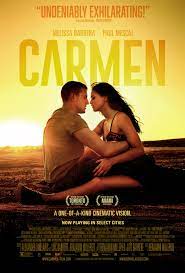
CARMEN
France/Australia/US, 2022, 116 minutes, Colour.
Melissa Barrera, Paul Mescal, Rossy de Palmer, Elsa Pataki, Benedict Hardie, Tara Morice.
Directed by Benjamin Millepied.
This interpretation of the Carmen story, based on Prosper Merimee’s 1845 novel with influences by Pushkin’s story, The Gypsy, rather than be says Opera, will be an acquired taste. With the French born choreographer, Benjamin Millepied, now working in the US, directing his first feature film after music videos, a huge emphasis in this version is dance.
Yet, one could describe the visual style and the staging of particular scenes as “operatic”, stylised, set pieces, larger than life. And, yet, many of the sequences are presented with a sense of “realism”. But, interspersed are touches of magic realism, ghostly appearances, scenes of fire, memories. The Internet Movie Database offers a summary: Benjamin Millepied's complete reimagining of CARMEN tells a story through an experimental dreamscape featuring an original score and songs. Yes, an experimental dreamscape.
And dance. This is a story of a young dancer, Carmen, Mexican, her flamenco-dancing mother, menaced by a young boy from the cartels shooting her. Her mother has urged her to go to Los Angeles, to find her friend, managing a nightclub there, Massilda. But, she has to get through the border, a dreary desert outpost, staffed by former soldiers to ward off migrants, violently. One of the soldiers is Aidan, a retired Marine, relying on his sister, with some friends, a boxer, but depressed in being stranded on the border.
As regards the drama, touches of melodrama, there is shooting at the border, Aidan defending some of the refugees, helping Carmen, driving away. They helped on the road by friendly taxi driver whose name is Angel. And another dancer friend drives them to Los Angeles. Which means than a lot of the film takes place within the nightclub, quite a range of dance which should exhilarate audiences who have come for the dancing. Aidan hangs out but feels the police will be after Carmen and himself and wants to move on. He gets an opportunity for getting some money from a friend who sponsors bareknuckle fighting – which provides something of a climax for the film, but presented, as is some of the other dancing, with ballet style, but this crowd excited by the violence, a stomping dance sequence.
Melissa Barrera (In the Heights, Scream) is a dramatic Carmen. Paul Mescal (Normal People, After some) blends passive moments with active moments. But, a star for Pedro Almodovar for many decades, Rossy de Palms, draws audience attention more than the star-crossed lovers. She is a powerful presence even when not singing or dancing. Elsa Pataki has a good role as the assistant at the nightclub. Carmen was filmed in Australia in 2021, the Broken Hill area for the desert sequences, some drab Sydney locations for the nightclub and the boxing. And many Australian actors, including Tara Morice, and dancers in the cast.
There are several songs, a great deal of choral chant throughout (incorporating some of the Bizet lyrics), but the strong impact is of the musical score itself, by Nicholas Brittell, powerful at times, the score seeming to drive on the action and the drama.
Some audiences have been enraptured, others alienated, and all stops in between.
1. The original novel, Bizet’s Opera, the many adaptations, films of the Opera, Carmen Jones in the 1950s? This new interpretation?
2. The work of the director, his reputation as a choreographer, his first feature film, his experience in music videos? Collaboration with the screenplay? The introduction of music, songs, their range, the choral background, the driving musical score? His interaction of dance, the range of dance, flamenco, modern dance, ballet, stomping dance…? The insertion of songs and dance into the screenplay and narrative?
3. The adaptation of the original story, the role of Carmen, the touch of the femme fatale, the soldier, love, danger?
4. The realistic, surrealistic settings, the desert (Australia standing in for Mexico), the drab border situation, the visuals, Los Angeles, the streets, the nightclub, the bareknuckle fighting? The comment on the experimental dreamscape? The move from realism to the surreal, to touches of magic realism, the importance of fire, the sparks, the ordinary slit, the burning globe…? Ghostly appearances?
5. Carmen, her relationship with her mother, her mother dancing, the little boy, shooting her, the Mexican cartels, the danger for Carmen, going to the border, the encounter with Aiden, the crossing of the border, the military patrol, the shootings, Aidan helping her, the truck, the taxi and Angel driving, his support, the dancer and his driving, arriving in Los Angeles, the goal of the meeting Masilda? The club, her being given refuge, Aiden with her, the bond with Michelle, memories of her mother, in the club, Gabriele, the dances? Carmen and the relationship with Aiden? The dancing? The need for escape, farewelling Must still do, going to the boxing, the pursuit, Aiden shot, the surrealism of the final dance between the two? Her future?
6. Aiden, Marine background, his service, the effect, with the others at the border, the patrol, their attitudes, his injured friend, reliance on his sister, life on the border, the patrols, attitude towards the refugees, the violence and the shooting? His helping Carmen, the escape, the taxi, the drive to Los Angeles, finding the nightclub, must still do welcoming him, his observing Carmen at the nightclub, the sexual encounter, his fear for the police pursuing, needing money, going to his friend, the arrangement for the bareknuckle fighting, his taking Carmen, the fight and its brutality, getting the money, the police arriving, the chase, the shooting, his being wounded, with Carmen, the symbolism of the final dance?
7. Miss older, her friendship with Carmen’s mother, the nightclub, her appearance, command, singing, dance? Support of Carmen? The farewell?
8. The people at the nightclub, Gabriel, the dances, the rooms of the club, the dance area, the theatrical area, performance?
9. Audience response in terms of the drama and melodrama, in terms of the dreamscape, the experimental style of the film, the musical score, the songs, the range of dancing?
Grand Piano
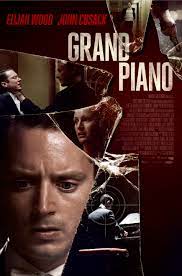
GRAND PIANO
US/Spain/UK, 2013, 95 minutes, Colour.
Elijah Wood, John Cusack, Kerry Biche, Alex Winter, Tamsin Egerton, Allen Leech, Don McManus, Dee Wallace, Jack Taylor.
Directed by Eugenio Mira.
Grand Piano is a Spanish-American co-production, featuring a predominantly American cast, filmed in Barcelona, the director Eugenio Mirror, a composer of scores for several films. And, this is important, because a great deal of the running time is devoted to the audience watching and listening to a classic music concert with a guest pianist.
However, the film is also a thriller, cleverly written by Damian Shah sell, his second screenplay, in his late 20s, about to write the Oscar-winning Whiplash, moving to RRA and, First Man and his extravaganza, Babylon.
The film features Elijah Wood in a very sympathetic role, a classical pianist, men toured by a famous composer, freezing while playing a difficult piece and absent from concerts for five years. This is his comeback in Chicago, the piano of his mental or being transported to Chicago for the performance. The pianist’s nervous, harassed with an interview during his limousine ride to the concert hall, but gaining confidence, supported by his actress wife, Keery Biche, and the entrepreneurial conductor, Don McManus.
The film begins with the performance but soon the thriller aspects emerge, a red arrow seen on the score, further instructions in red inserted into the score, then contact by earphone with a sinister presence, threatening the death of his wife, urging the performance to be accurate.
The audience needs to of paid attention to a lot of the detail about the composer, his money and its disappearance, his employing a locksmith, the transporting of the piano to Chicago, some visualising during the concert of the mechanisms working within the piano, and, ultimately, the realisation that the accurate performance of the concert will mean the pianist hitting the note which will open up the piano and reveal the hidden money.
John Cusack’s voice is recognisable throughout the film is that of the man threatening, and he finally appears. Alex Winter is the Usher of the concert hall in league with Cusack.
For those who enjoy music, there is a great deal to enjoy, Elijah Wood convincing as the pianist with agile fingers. For those who are intrigued by the thriller aspects, an urge for them to pay attention to every detail.
1. The title and expectations? The visuals of the credits? The piano itself, being transported to Chicago, its value, its reputation, the dead composer? It is being reassembled in Chicago, the plan for Tom Selznick to perform after five years?
2. The audience having to be attentive to the piano, the story of the composer, his money, his disappearance, the mechanic and his fixing the piano, the hiding of the money, hitting the right note to release it? The piano during the performance, the visuals of the mechanism within the piano? Tom and the performance, hitting the wrong note, the consequences for his persecutor? The persecutor crashing onto the piano, Tom going back to play, hitting the correct note – and the film fade to black?
3. The importance of the musical score, the extensive performance of concert pieces during the film? The director and his career in composing for Cinema?
4. Tom Selznick, Elijah Wood, his character, piano skills, bond with his wife, his mentor, his skill at playing the pieces, the performance, his freezing, absence for five years? The death of the composer? His wife arranging the recital? The flight to Chicago, apprehensive? Arriving, the chauffeur, having to change his clothes, phone calls with his wife? The extent of publicity interview during the drive, the insistence of the interviewer, focusing on his nerves, reputation? The arrival of the theatre? Audience interest in him as a character, Elijah Wood persuasive?
5. The plan for the concert, the piano arriving, it being returned after the performance? The usher and his welcoming Tom, the folder with the score, the insertion of Cinquettes, Tom finding it, screwing it up, throwing it away, the janitor putting it in the fire, the usher observing? Norman, conductor, welcoming, the orchestra?
6. Tom and his wife, her cinema career, singer, the publicity, hosting the event, Chicago society, the full house, Ashley and Wayne, their interactions, relegated to their seats, not in the box with Emma?
7. The audience applauding Tom, his getting ready to play, with conductor, the orchestra, his agility with his fingers and people’s comment on this agility?
8. The performance, Tom suddenly finding the red arrow, turning the page, the list of instructions, the mysterious voice, speaking, the earpiece, the phone, the threats to Amber, the insistence on the accuracy of the performance, every note, the threat of death? The audience realising or not realising the significance of playing every note correctly – and the money?
9. Phoning Wayne, with Ashley, the disturbance in the theatre, Wayne leaving, the usher, the interactions, his death?
10. The relation of the usher being in contact with the persecutor, the plans, alterations, the firing of the shot and the audience not hearing? The red dot, and being seen on Emma? Tom, the dilemmas, leaving the stage, returning, continuing the performance, disturbance? Completing the first half of the concert?
11. The intermission, Emma and Tom, his being reassured? The persecutor insisting on playing Cinquettes? The lost copy, Tom and his computer, listening to the score, his annotating the page of the theatre layout?
12. The persecutor, the desperation, insistence, the clashes with the usher, his death?
13. The change in the performance, Tom and the difficulty of the piece, agile fingers, then playing the wrong final note? The audience not knowing, applause? Tom and is insisting that Emma singing from the box, Motherless child?
14. Tom, leaving, the dead bodies, the confrontation with the persecutor, the revelation of his role with the piano, behind-the-scenes, going to the top of the mechanism, the fight, Tom hanging, being pulled up, the persecutor falling, breaking the piano?
15. Tom, the fall, saying his leg was broken, Emma safe, his going back to the piano, playing the right note – and the mechanism to reveal the money starting? Fade to black?
